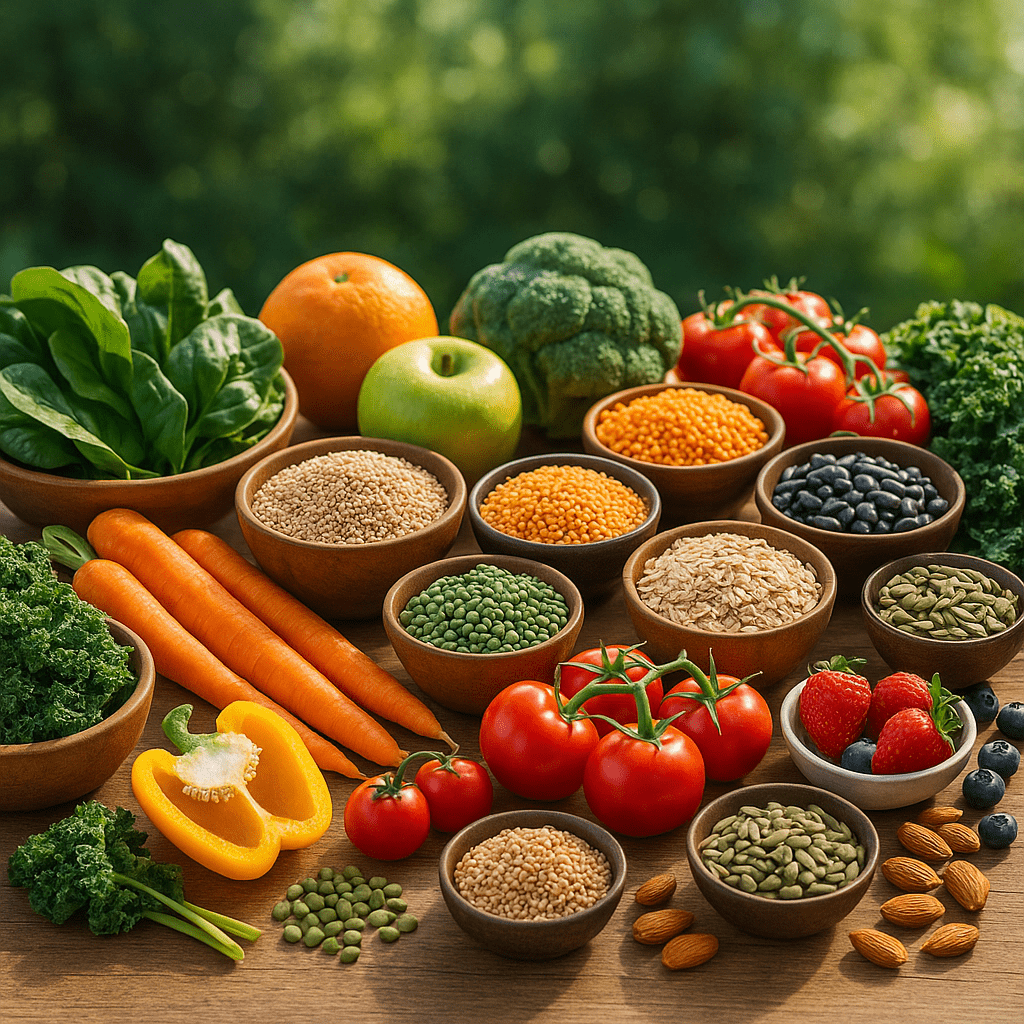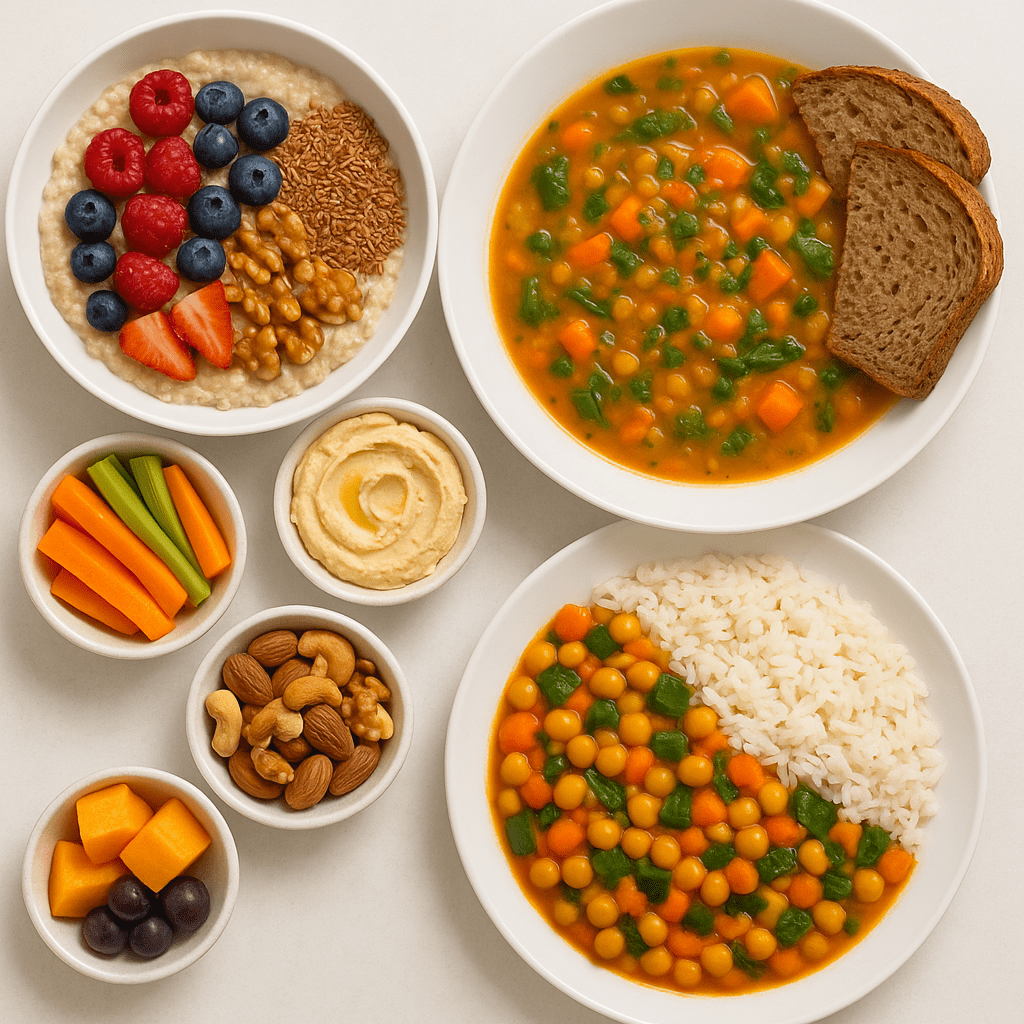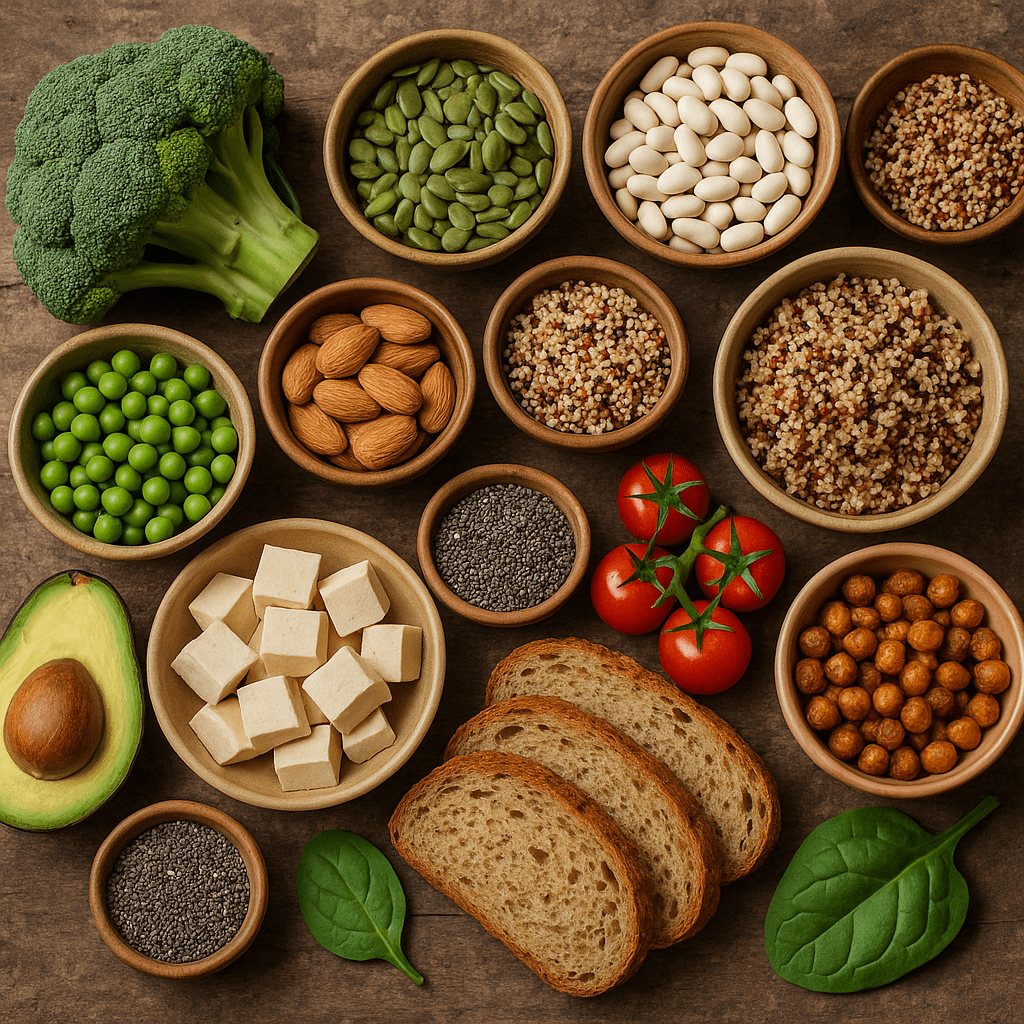Plant-based foods are foods that are based on plants: vegetables, fruits, whole grains, legumes, seeds, and nuts.

In recent years, there has been a growing interest in plant-based diets. Although the term “plant-based diet” is often associated with veganism, it actually means that the majority of the diet consists of plant-based foods, although animal products are sometimes consumed. Most plant-based foods, such as spirulina, can have a positive effect on the functioning of the gut and immune system; you can read more about how spirulina improves digestion and overall well-being in a special article.
In this article, you will learn about the different types of plant-based diets, the main health benefits, the most important plant-based foods to enrich your diet with, and practical tips on how to start eating healthier.
What is a “plant-based diet”?
Key concepts and differences
A plant-based diet encompasses a variety of dietary patterns that vary in the amount and frequency of animal products consumed.
- Vegan diet – a diet that completely excludes all animal products, including meat, dairy, eggs, and honey.
- Vegetarian diet – a diet that excludes meat and fish, but may include eggs and dairy.
- Flexitarian diet – a diet that is primarily plant-based, but occasionally includes meat and other animal products.
- Whole plant-based diet – a diet that is based on whole, unprocessed plant foods and avoids highly processed foods.
The European Food Safety Authority emphasizes that even a small increase in plant-based foods can have a positive impact on health. Dr. T. Colin Campbell, known for his research on plant-based diets, states that at least 80% of plant-based foods should be consumed for optimal health.
Health Benefits of Plant-Based Foods
Scientific studies reveal numerous benefits of plant-based foods for both physical and mental health. One of the most important aspects is cardiovascular health.
- Weight management – plant-based diets tend to be lower in calories and fat but higher in fiber, which helps maintain a healthy body weight.
- Heart health – studies show that plant-based diets lower cholesterol, blood pressure, and the risk of heart disease.
- Diabetes risk reduction – plant-based foods stabilize blood sugar levels and increase insulin sensitivity.
- Cancer prevention – the high antioxidant content of plant-based foods may help protect against certain types of cancer.
The World Health Organization recommends increasing your intake of plant-based foods as one of the main measures for preventing chronic diseases. However, when starting a plant-based diet, it is important to pay attention to sufficient amounts of some nutrients (protein, iron, vitamin B12, omega-3 fatty acids).
Gut Health and Microbiota
Plant-based foods are rich in fiber and prebiotics, which have a positive effect on the intestinal microflora. A healthy microbiota strengthens the immune system, improves mood, and helps better absorb nutrients. Recent studies show that a variety of fiber in the diet promotes a diverse microbiome in the gut.
Natural supplements, such as chlorella, can complement the immune effects of a plant-based diet, as they have anti-inflammatory properties and help eliminate toxins from the body.
The most important plant-based foods
Diversity is one of the most important aspects of a plant-based diet, ensuring that you get all the necessary nutrients.
Fruits and vegetables
- Leafy greens – spinach, kale, Swiss chard (calcium, iron, vitamins)
- Brightly colored vegetables – carrots, tomatoes, bell peppers (vitamins A, C, antioxidants)
- Fruits – apples, berries, citrus (vitamins, antioxidants)
Whole grains
- Grains – rye, oats, wheat, rice
- Cereals – buckwheat, quinoa, millet
Protein products
- Legumes – lentils, chickpeas, beans, peas
- Soy products – tofu, tempeh, edamame
- Nuts and seeds – almonds, walnuts, flaxseeds, chia
Plant-based milk substitutes
- Almond, oat, coconut, soy milk
Fermented products
- Fermented vegetables, kimchi, kombucha, tempeh
Explore natural superfoods like resveratrol, which may provide additional metabolic and health benefits as part of a plant-based diet.
Possible obstacles and myths about plant-based diets
The transition to a plant-based diet often raises questions and doubts, which are based on common myths.
Protein myth
Legumes, soy, nuts and seeds are excellent sources of protein. 100 g of lentils contain about 9 g of protein, and tofu – up to 20 g of protein per 100 g of product.
Iron absorption
Although plant-based iron (non-heme) is absorbed less well than animal-based iron, vitamin C increases its absorption. Consume vegetables with lemon juice or fruit after meals.
Vitamin B12 issues
Vitamin B12 is mainly found in animal products. When switching to a strict plant-based diet, it is recommended to take B12 supplements or fortified foods.
Vitamin D
Sources of vitamin D include sunlight and some fortified plant products. Supplements may be necessary in winter or if you live in northern latitudes.
Omega-3 fatty acids
Flaxseeds, chia seeds, and walnuts are excellent plant-based sources of omega-3, but you need to ensure you get enough.
Registered dietitians emphasize that a well-planned plant-based diet can meet all of your body’s needs. However, it’s a good idea to consult a professional before switching to a plant-based diet, especially if you have specific health concerns.

Practical tips for starting a plant-based diet
It is best to change your eating habits gradually, incorporating more and more plant-based products.
Start small
- Incorporate “meat-free” days into your week
- Replace your usual products with plant-based ones: cow’s milk with plant-based, meat with legumes
- Always dedicate half of your plate to vegetables
Product replacement ideas
- Instead of eggs in baked goods – banana or flaxseed “egg”
- Instead of cream – coconut cream
- Instead of meat – marinated tofu, tempeh or chia seeds
Aim for variety
- Nutritionists recommend aiming to eat 30 different plant-based products per week to ensure a variety of nutrients and good gut health.
Recipe ideas
- For breakfast: oatmeal with nuts, berries and flax seeds

- Lunch: Lentil and vegetable soup with whole grain bread
- Dinner: Chickpea stew with vegetables and rice
- Snack: Hummus with vegetables, nuts, fruit
If you are considering additional supplements, berberine may help maintain blood sugar and cholesterol balance by complementing a plant-based diet.
Summary
Plant-based foods offer a wide range of health benefits, from improved heart health and weight control to a reduced risk of chronic disease. It’s important to remember that a plant-based diet isn’t all or nothing – even small changes to your diet can yield significant benefits.
Start small, experiment with new foods and recipes, and aim for variety.

The most important thing is that a plant-based diet is enjoyable and meets your individual needs. Gradually transitioning to a plant-based diet is a great way to take care of your health and the environment.
Frequently Asked Questions
What is the main difference between a plant-based diet and a vegan diet?
A plant-based diet focuses on making the majority of your diet plant-based, but it does allow for occasional animal products. A vegan diet completely eliminates all animal products.
Can you get enough protein on a plant-based diet?
Yes, by including a variety of sources, such as legumes, soy, nuts, and seeds, most people can meet their protein needs without animal products.
What nutrients might be missing on a plant-based diet?
Some nutrients (vitamin B12, iron, vitamin D, and omega-3 fatty acids) can be harder to get, but strategically choosing foods and, if necessary, supplements can help fill these gaps.
How do plant-based foods improve gut health?
Fiber-rich plant-based foods promote the growth of a variety of beneficial gut bacteria, improving digestion, immunity, and even mood.
What are the first steps to trying a plant-based diet?
Start by replacing animal products with plant-based alternatives at a few meals a week and increase the variety of fruits, vegetables, whole grains, legumes, and nuts in your diet.

